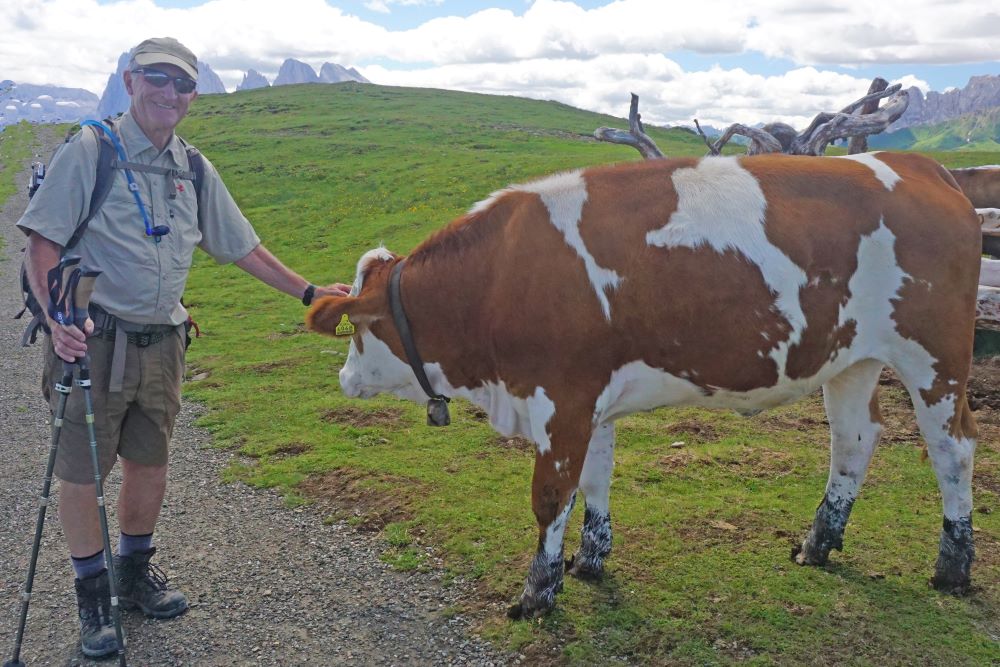New Ag-Food Innovation Endowment Fund focused on supporting leading edge research
Donna McKinnon - 5 August 2022

Gary Sargent (pictured above), along with fellow ALES alumni Harvey Glasier and Rick Andrews, created the Ag-Food Innovation Endowment Fund as a way to give back to their former faculty.
Through varied career paths, marriages, births and other benchmarks of life, the Class of ‘69 stayed close. Armed with agriculture degrees and a hunger to make their marks, the graduates dispersed to farms and industry. They lived their lives and built their communities but stayed in touch, connected not only by their mutual experiences but also their gratitude for the University of Alberta education that set them up for success.
Gary Sargent is one of those graduates. Born and raised in Calgary, Sargent’s animal science degree was the bedrock for a multifaceted and accomplished career working for the Alberta Wheat Pool, the Alberta Beef Producers — and in the latter part of his career — as a consultant on land and wildlife issues with the Canadian Association of Petroleum Producers and the BC Oil and Gas Commission.
Believing that great universities have great alumni support, Sargent, along with fellow classmates Harvey Glasier and Rick Andrews, were looking for ways to give back to their former faculty — now the Department of Agricultural, Food & Nutritional Science in the Faculty of Agricultural, Life and Environmental Sciences — in a more substantive way, beyond the usual alumni events and bursary contributions.
Working with the faculty, including Katherine Irwin, associate director, development, and Kathy Fitzgerald, manager, major gifts and planned giving in the Office of Development and Alumni Relations, they created the Ag-Food Innovation Endowment Fund to support innovative activities for students and researchers. Administered directly by the faculty dean with guidance from the chair of the department, the fund will ensure innovations and emerging agricultural science will be adopted and incorporated into teaching and research programs in the department for generations to come.
“A bunch of old aggies aren't the people to be hands-on when you start talking about research,” laughs Sargent. “We need new minds to make these decisions, and it has to be set up in a way that someone can pick up the torch and carry it for you. One of the benefits of being able to get the faculty involved is that you're going to be focused towards the leading edge rather than the trailing edge. The Ag-Food Innovation Fund will stay current because it’s not directed at the specifics of a research project where interest may wane over the years, but more generally with the potential for more meaningful outcomes.”
Giving back to the community is something that Bryan Perkins and his wife Sharon have made a life-long priority. Raised on a farm in the Wainwright area that his grandparents homesteaded in 1908, Perkins’ own grandchildren are now the fifth generation to live and work in the area. Among their many charitable activities, supporting post-secondary education in agriculture is a commitment he and his family are passionate about.
“We have been blessed with an opportunity to do something we love, to live in a great community in a wonderful country and to have family coming along behind who work hard, work smart and make us proud of their contributions to agriculture,” says Perkins. “Fifty three years later I'm still working and having a ball and if we can contribute in a small way to help agriculture going forward, we think it's our responsibility. Knowing that Gary and Harvey (Glasier) had been working hard on getting the fund set up and looking at the long term purpose which I support, I decided to make a contribution to help get it rolling.”
Harvey Glasier, along with his wife Barbara, a nurse, moved across the country in various professional roles including program management, consultancy and farming. Now retired to Lacombe, Glasier says his agricultural degree opened up doors for him, and that gratitude is now fueling his philanthropy.
“As we age our minds have turned to our legacy,” says Glasier. “Our children, their spouses and our grandchildren, of course, are our greatest legacy. More recently, we have started to make regular conscious decisions to contribute dollars to some local charities we feel connected to, and the Ag-Food Fund allows us to make a significant contribution to help agricultural students at the U of A, by providing them with more resources to learn, develop and create. We have chosen to leave a percentage of our estate to the fund, and we assume that upon passing this will help reduce taxes for the estate.”
Sargent made an initial contribution to the fund as well as a legacy gift through his will, and is hopeful that other alumni, corporate donors and agribusiness entrepreneurs will make individual contributions to achieve and hopefully, far exceed the minimum goal of $50,000 dollars within five years.
"The U of A has nowhere near as much as some of the big US schools in terms of endowment funding from alumni,” says Sargent. “Our group is hoping to encourage all alumni to think about giving back. We really hope the AgIE Fund will stimulate others to contribute."
If you are interested in learning more about the Ag-Food Innovation Endowment Fund Fund, please click here.